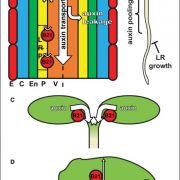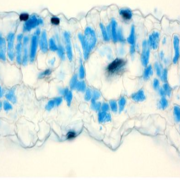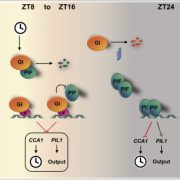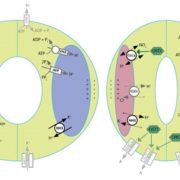Oscillating aquaporin phosphorylations and 14-3-3 proteins mediate circadian regulation of leaf hydraulics (Plant Cell)
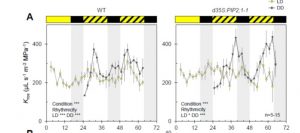 Plant activities change drastically between the light and dark times of day. Many of these different activities can be observed through transcriptional studies, which show that gene expression goes up and down over the course of the day. Many of these transcriptional changes are driven by the circadian clock. Here Prado et al. show that transport of water in leaves (hydraulic conductivity) also follows circadian patterns, and that these patterns are in part driven by post-translational modifications of the aquaporin channel protein AtPIP2;1. These clock-driven cycles of phosphorylation / dephosphorylation may affect interactions with 14-3-3 proteins. Understanding clock-regulated leaf water status may lead to improvements in crop performance. (Summary by Mary Williams) Plant Cell 10.1105/tpc.18.00804
Plant activities change drastically between the light and dark times of day. Many of these different activities can be observed through transcriptional studies, which show that gene expression goes up and down over the course of the day. Many of these transcriptional changes are driven by the circadian clock. Here Prado et al. show that transport of water in leaves (hydraulic conductivity) also follows circadian patterns, and that these patterns are in part driven by post-translational modifications of the aquaporin channel protein AtPIP2;1. These clock-driven cycles of phosphorylation / dephosphorylation may affect interactions with 14-3-3 proteins. Understanding clock-regulated leaf water status may lead to improvements in crop performance. (Summary by Mary Williams) Plant Cell 10.1105/tpc.18.00804


